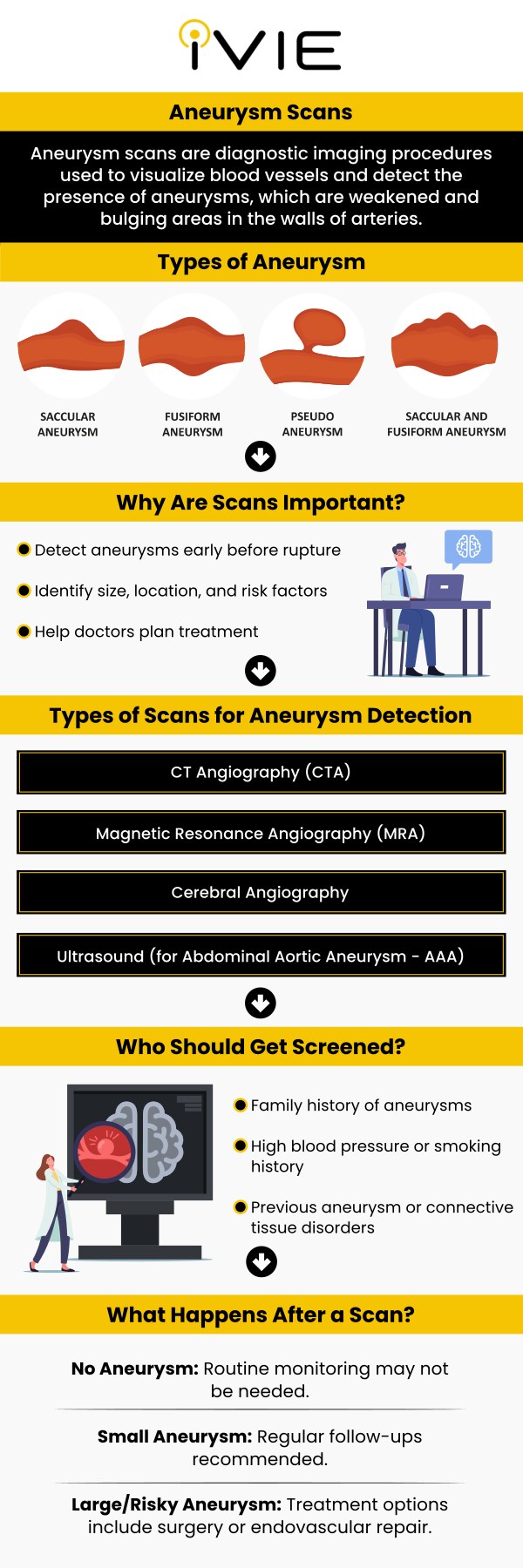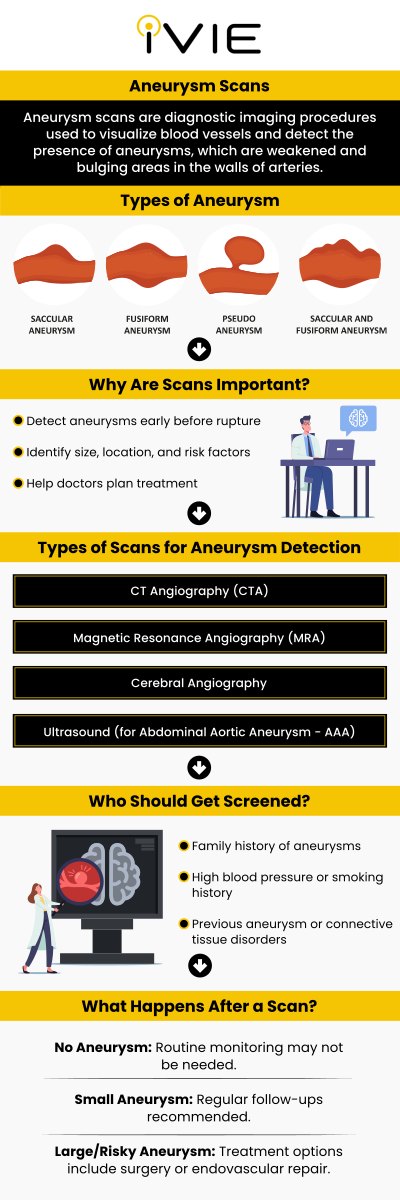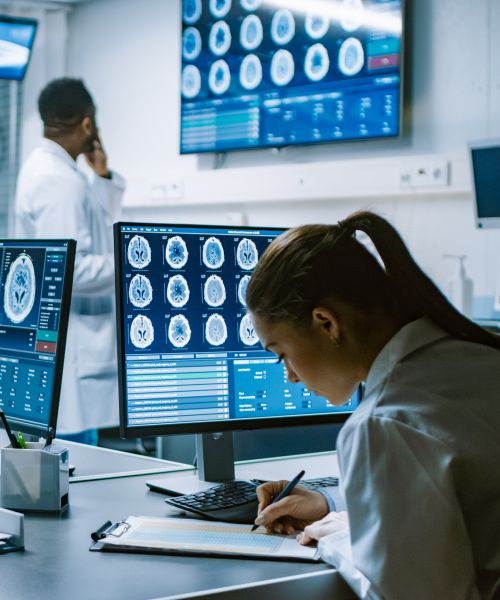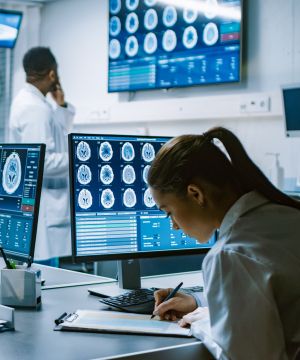Aneurysm Scans Specialist in Culver City Los Angeles, CA
An Aneurysm Scan is an imaging test used to detect and assess aneurysms—abnormal bulges in blood vessels that can pose serious health risks if they rupture. Common types of scans include CT, MRI, or ultrasound, which provide detailed images to help diagnose the size, location, and risk of an aneurysm. These scans are crucial for monitoring aneurysm progression and guiding potential treatment options to prevent life-threatening complications. At the iVIE MRI Diagnostic Center, Dr. Kourosh Naini and our team of experienced professionals offer Aneurysm scans. For more information, contact us or book an appointment online. We are located at 11600 Washington Pl Suite 104A, Culver City, CA 90066.




Table of Contents:
Can aneurysms be detected with MRI?
What tests are done to check for aneurysm?
What is the best MRI scan for an aneurysm?
How accurate is an MRI for a brain aneurysm?
Brain aneurysms, which are abnormal bulges in the wall of a blood vessel, can be diagnosed through several imaging tests, and MRI (Magnetic Resonance Imaging) is a leading choice among them. This high-resolution imaging tool is particularly effective for identifying brain aneurysms, thanks to its use of a powerful magnet and radio waves to create detailed images of body tissues, organs, and bones.
In many cases, an unruptured brain aneurysm might be discovered incidentally during an MRI scan conducted for other reasons, such as evaluating headaches or other neurological symptoms. This incidental discovery often occurs because MRI is sensitive enough to detect even small changes or abnormalities in the brain that might indicate the presence of an aneurysm.
When checking for an aneurysm, medical practitioners have a variety of imaging tests at their disposal. Initially, they often order an MRI or a CT (Computed Tomography) scan. The CT scan, which uses a combination of X-rays and computer technology, produces horizontal images of the body. These images are particularly detailed, showing the bones, muscles, fat, and organs with more clarity than standard X-rays.
This makes CT scans highly useful for detecting aneurysms, especially if they have ruptured. An MRI, on the other hand, uses large magnets and radio frequencies to produce detailed images of organs and structures within the body, including the brain. MRIs are often the leading choice in the detection of aneurysms among the specialists at iVIE MRI Screening Clinic as part of their proactive efforts toward healthcare and early diagnosis of aneurysms.
Other diagnostic procedures include an Echocardiogram (Echo), which evaluates the structure and function of the heart using sound waves. This test is crucial if the aneurysm is suspected to be near or involving the heart. An Arteriogram (Angiogram) is another test used, where an X-ray image of the blood vessels is taken.
This involves injecting a dye through a flexible tube placed in an artery, making the blood vessels visible on X-ray and helping to locate the aneurysm. Lastly, an Ultrasound uses high-frequency sound waves to create images of blood vessels, tissues, and organs, assessing blood flow through various vessels, which is instrumental in detecting aneurysms.
The specialists at iVIE MRI Screening Clinic will work with patients to determine the best-advanced screening services according to each patient’s unique needs.
The best MRI scan for detecting an aneurysm is typically an MR angiography. This specialized MRI technique captures detailed images of the arteries, thereby effectively identifying the size, shape, and location of an unruptured aneurysm.
MR angiography stands out for its precision and detail, making it an invaluable tool in the diagnostic arsenal against brain aneurysms. The high level of detail provided by MR angiography is crucial for planning any necessary treatments or interventions and for monitoring the aneurysm over time.
The accuracy of MRI for detecting a brain aneurysm is generally very high. In many cases, it boasts an accuracy rating of upwards of 80%. This level of precision makes MRI, particularly with angiography, a reliable method for identifying unruptured brain aneurysms.
However, the use of imaging tests like MRI to screen for unruptured brain aneurysms may not be recommended unless the individual is at high risk, such as having a family history of brain aneurysms or a disorder that increases the risk of developing them.
When an MRI does detect an unruptured brain aneurysm, the doctor will consider various factors to determine the appropriate treatment, which could range from regular monitoring to more immediate interventions.
Aneurysm screening is available at the iVIE MRI Screening Center. For more information, contact us or book an appointment online. We are located at 11600 Washington Pl Suite 104A, Culver City, CA 90066. We serve patients from Culver City Los Angeles CA, Downtown LA, Beverly Hills CA, Marina del Rey CA, Venice CA, Santa Monica CA, and surrounding areas.


Additional Services You May Need
▸ Dementia Screening
▸ Aneurysm Screening
▸ Spine MRI
▸ Whole Body MRI Screening
▸ MRI Brain Screening
▸ Brain PET
▸ Work/Sport Spine Injury Diagnosis
▸ Work/Sport Brain Injury Diagnosis
▸ Whole Body PET For Cancer
▸ MRA Brain Screening


